My grandmother always said the biggest business deals were made on the golf course. When I looked around at the majority-male 2016 WTIA Golf Tournament, her words reverberated in my mind. How many women were missing out on forming valuable industry connections that day? Later, WTIA – the non-profit I work for as Director of Member Relations – received feedback from people who echoed my concerns. The desire to see women participate in the tournament was there, but it wasn’t actually translating to the golf course even though, at least technically, all genders were welcome at the event. It was clear that despite the great strides women have made in the professional sphere since my grandmother first began forming her observation, the imbalance I was witnessing wasn’t going to fix itself. It would take intentional, strategic action.
I decided to form the tournament’s first women-only training group and team. I rounded up eight members and we met up once a week for six weeks and learned how to play golf. We drank beer, ate snacks, and worked on our skills in a pressure-free environment. Once the tournament rolled around, however, we were hit with a dose of reality. One man asked a teammate what hole she was working at, assuming she wasn’t there to play in the tournament; another asked a woman if she could connect him to one of the partners at her company, not considering the fact the woman herself might be a partner (she was). Someone else expressed frustration at us for going the wrong way on the lawn, and other men gave us unsolicited coaching advice. For better or for worse, we weren’t exactly surprised by these uncomfortable interactions. After all, changing people’s biases doesn’t happen overnight. The all-women team members agreed that it was a beneficial learning experience overall, and wanted to continue making male-dominated spaces more woman-centered.
To th at end, I next put together a women’s poker tournament. Poker is another activity typically coded as masculine, which means few women learn it and those who do can be averse to playing it since they’ll likely be playing with men. (Fact: Significantly more women play poker online than in-person, probably for this reason.) The interest in the event was staggering—75 women ended up participating. The turnout reaffirmed my belief that many women were interested in doing traditionally “manly” things, as long as intentional spaces were created for them to feel comfortable in. Being the only woman on the golf course or at the poker table can be a daunting experience, and those spaces will remain male-dominated if we are only relying on women to brave such spaces independently.
at end, I next put together a women’s poker tournament. Poker is another activity typically coded as masculine, which means few women learn it and those who do can be averse to playing it since they’ll likely be playing with men. (Fact: Significantly more women play poker online than in-person, probably for this reason.) The interest in the event was staggering—75 women ended up participating. The turnout reaffirmed my belief that many women were interested in doing traditionally “manly” things, as long as intentional spaces were created for them to feel comfortable in. Being the only woman on the golf course or at the poker table can be a daunting experience, and those spaces will remain male-dominated if we are only relying on women to brave such spaces independently.
These experiences have opened my eyes to exactly what it will take to challenge the ubiquity of professional, male-dominated spaces. I’m taking all I’ve learned to my company so we can use it to best empower women in tech. WTIA is committed to creating intentional, professional spaces for women where networking and growth can flourish without being stifled by the pervading cultural norms that discourage women from full participation and therefore maintain the gender imbalance. If you care about doing this work with us, contact me at toni@washingtontechnology.org and tell me how you want to shake things up or come see me at the Women in Cloud Summit on January 26th to build your network and expand your tribe!
Credit: This article was written by Toni Colman, Director of Member Relations, Washington Technology Industry Association


Leave a Reply
Want to join the discussion?Feel free to contribute!